- Home
- Franklin Horton
Brutal Business: Book Three in the Mad Mick Series Page 6
Brutal Business: Book Three in the Mad Mick Series Read online
Page 6
Wayne wove his way through the maze of cars and extended his hand to Conor. “Good to see you, my friend.”
"Good to see you upright and on this side of the dirt. I heard you were looking for me.”
Wayne nodded. "I saw Johnny Jacks’ son and daughter-in-law the other day. I asked them to relay that message if they saw you."
"They did. We’ve dropped in on them every couple of days to make sure they’re recovering from their injuries. They had a rough go of it."
"They may recover from the physical injuries but the mental effects may take a while longer. You don't experience a home invasion, take a beating like that, and not be changed by it."
"They also lost someone dear to them," Conor said. "I hate to be practical about it but if the whole mess makes them a little meaner and a little quicker on the trigger, it’ll improve their odds of survival.”
“That’s one way of looking at it.”
“So what did you need of me? Johnny and his folks didn’t know. Just said to catch up with you at my first opportunity. We best get on with it. I can’t be lollygagging about the countryside when I’ve got knitting and shit to attend to.”
Wayne smiled at that, the thought of the most dangerous man he’d ever met sitting around a circle of old ladies knitting. Conor had this way of talking that made it hard to tell when he was joking and when he was being sincere. It made him hard to read. One thing was certain, though. If he ever saw Conor coming at him with a pair of knitting needles he was running like hell because it meant someone was about to die a silent and painful death.
"I’ve got a little mystery on my hands,” Wayne said, “and I need some backup from someone who knows the country and knows how to handle himself."
"Oh, I love a good mystery," Conor said, intrigued. “Especially if it involves aliens.”
Wayne considered this. “There could be aliens, but I don’t think so. Pastor White’s folks found a body in the river by their church. It was snagged on a tree and had a couple of bullet holes in it."
"Ah, but uncovering strange bodies is nothing new," Conor said dismissively. "In times like these, people settle old scores or they shoot people while trying to rob them. They dispose of the bodies without telling a soul. It could even be a body left over from our recent battle. Could have been snagged upstream and just broke loose."
“Not with the turtles in that river. If my people leave a stringer of fish in there overnight, we have nothing but fish heads by morning. Turtles would hit a human body like a buffet and leave nothing but a skeleton."
"Sounds like you have a firm grasp on the facts,” Conor said with a grin, “being that you’re an amateur medical examiner and all."
Wayne chuckled. "No. The pastor said his folks know the man. They said he was by their camp a few days earlier asking after his mother."
“Okay, that gives us a little more to go on. Guy shows up looking for his mother and two days later he turns up in the river poked full of holes. How did this get dumped in your lap?"
"Some of the pastor’s folks asked me about it. They’re concerned there may be a murderer in their community."
“Hell, I can speak to that,” Conor said. “It’s likely there’re dozens of murderers in their community. It’s what people do when the rules go by the wayside and Johnny Law ain’t on the job. Did the pastor himself speak to you about this?”
"No. I'm not sure he can speak at all after Barb broke his jaw. Her actions made my presence in this neighborhood a little difficult, as you might imagine. The pastor sees me as being aligned with that crazy Irishman and his daughter. His feelings are still a little hurt."
"I imagine so. He got his ass handed to him by a little girl. That doesn’t sit well with some people.”
“Yeah, well she’s not a little girl anymore, Conor, and the only reason I’m considering getting involved here is because I need to mend some fences. This might allow you to mend some fences too. People respect the pastor in this community. We need to acknowledge that.”
Conor nodded. “I get that and you’re right, but a wise man learns who he’s messing with before he runs his mouth. She warned him.”
Wayne held a hand up. “I’m not here to argue that point. I know why she did what she did. But back to this dead body, the pastor’s people are scared because they thought they knew their community. They’re genuinely concerned that there might be a kidnapper out there who might kill to keep his secret. If it buys me some brownie points with the locals, I’m at least willing to give this matter a little of my time."
"Then I’m with you," Conor said. "Winning local hearts and minds is a worthwhile effort. Do you have anything to go on?"
“The pastor’s people said the dead man was from this valley but hadn’t lived here in years. His mother did, and he walked several days from a neighboring town to check on her but the house was empty. There were indications that people had been in there recently so it made him think she wasn't dead. They all say she was a hard country woman who grew up without power and would have been fine in these conditions. She had a woodstove, canning, and a few chickens.”
"And the pastor’s people had no idea of her whereabouts?"
"No one recalled seeing her since the early days of the collapse. When they passed that information to the son, he said he had a few folks he wanted to talk with before he gave up and went home. The next thing they knew, he showed up dead in the river."
"And they suckered you into helping?"
Wayne smiled. “They asked and it’ll be a long winter with no friends close by. I’d rather have Pastor White’s folks waving at me than shooting at me.”
“When do you want to start?” Conor asked.
“No time like the present.”
9
Two miles up from the firehouse, Conor and Wayne approached a decrepit mobile home rising from a pile of wrecked vehicles, broken appliances, old lawnmowers, and assorted other junk. Wood smoke rolled from a stovepipe jutting through a wall, pointing crookedly toward the gray sky like a beckoning finger. Wayne called out and a scrawny young man poked his head out the door. He waved, told them he’d be right with them, and ducked back inside. When he reappeared a moment later he was wearing a brown canvas work coat with a Red Man Chewing Tobacco toboggan pulled down to his bushy eyebrows.
"That’s Bernard," Wayne said as the boy walked toward them. "His family said he’d guide us to the old lady's house."
Conor studied the young man. Beneath the open zipper of his coat he wore jeans with a camouflage shirt tucked neatly into them. "He appears to be about twelve years old.”
"He's twenty-two, according to his parents. I asked because I didn’t want to be responsible for someone’s kid."
Conor cast an eye to the steep mountains to either side of them. "They ripen late in here. Grow tall and stringy like weeds. I guess they don't get enough light."
Wayne smirked. "Apparently, the girls get plenty of light. Most are married and have several kids by his age."
"Whereabouts am I riding?" Bernard asked when he reached them.
"You'll be behind me," Wayne said. He extended a forearm to help the boy swing up but Bernard stepped nimbly onto the rotting trunk of a Pontiac Fierro. From there he flung himself across the back of the horse and awkwardly wiggled into position.
"Where we headed to, boy?" Conor asked.
"I ain’t no boy," Bernard snapped, offended by Conor's tone.
"I’d recommend you not get off on the wrong foot with Conor," Wayne said. "If he tells you a chicken can plow the cornfield then you best be getting the harness."
The boy continued to glare at Conor, who gave him a bemused smile. While Bernard must think he was menacing with his hateful squint, Conor found him to be more comical. With the toboggan pulled down to his eyebrows and his large red ears sticking out like jug handles to each side, he almost appeared cartoonish, like a Norman Rockwell caricature of a gangly teenager.
Wayne clucked his horse into motion. "I reckon
there are folks who hold a grudge over your daughter breaking the preacher's jaw.”
"Reckon they is," Bernard agreed.
"This could be a long ride," Wayne muttered.
Conor emitted a loud, musical laugh. He loved an adventure and he’d be seeing new country today. Let the lad sit there like soured milk. It wouldn’t ruin his day.
The clop of their shod horses on the dirty asphalt was the only sound beyond the churning of the dark river. It had rained the night before and the road was damp, carpeted with rotting leaves in yellow, brown, red, and orange. Conor found it beautiful despite the state of things. He’d learned a long time ago to take beauty where he found it because he might not find it again. It was a lesson learned from his mother when he asked why she spent so much time tending flowers that were only going to die when the weather got cold.
After nearly thirty minutes of riding Bernard pointed a bony finger with a grimy nail toward an overgrown driveway. "That there takes you to Fannie Bell’s house."
Conor assumed Fannie Bell must be the missing lady, though he’d not heard her name before. It was the kind of antiquated name that no one used anymore. Her tiny frame house hung on the hillside like God had kicked the toe of a boot into the steep slope then shoved the house into the pocket he’d created. It was all hill in the front and hill in the back with no yard to speak of. If a drunk fell over in the yard, he’d roll for a good distance before stopping. Same with snow and ice. One slip and you’d not stop until you hit the main road or collided with a tree. Conor wondered how many guests Fannie Bell had lost in that manner.
They turned up the faint gravel path that led to the house. It was the kind of driveway that belonged to people who didn't own a vehicle. Conor figured it was a bear to negotiate even in ideal conditions due to its narrow footprint and deadly steep shoulder. Kudzu was well on its way to overtaking the house and the dead brown vine enclosed it like a cargo net trying to snatch the house into the depths of the Earth. It was built of Masonite siding covered in three colors of peeling paint. It had a metal roof with rust showing through multiple applications of silver roof coating. There was a chimney of square gray flue block that climbed one wall and jutted through the eave. There was no smoke coming from it on this cold day.
Conor knew that in a little old house like this a rough-spun country woman could survive indefinitely if she had a good supply of preserved food. If the house didn’t already have gravity-fed spring water, the cheapest means of running water available, it was likely there was a spring within a short walk of the house. There was plenty of deadfall and scrap wood for Fannie Bell to burn in her stove. She’d have been fine.
Just because you had the tools to keep you alive didn’t mean you’d live, though. Besides natural causes there were plenty of unnatural ways to die. The simplest was that somebody meaner than you decided they wanted your stuff and were willing to kill you to get it. You could be the most prepared individual in the world and die of simple bad luck. Skills and supplies were not a magic elixir that guaranteed survival.
They stopped at a porch that spanned the entire front of the house and tied their horses off near a bottle tree. The base of the tree trunk was painted white in an old country tradition of painting yard trees to match the house. The branches had been pruned back in a harsh and unflattering manner, the stubs that remained decorated with an assortment of multicolored glass bottles.
Bottle trees were a southern tradition thought to have come from Africa. Superstitious folks thought that spirits wandering in the night would get trapped inside the bottles and not be able to find their way out. In the morning, the sunlight would destroy them. Conor didn't worry much about spirits. He worried more about things that required a bullet to stop. Many of the ghost stories, songs, and superstitions of these Appalachian people had come over from Ireland. Those same Irish immigrants had contributed to the complex accent of the region.
The lanky Bernard went to the concrete steps and latched onto a handrail made of galvanized water pipe. The rise and run, two critical measurements of making steps, were inconsistent and awkward. It didn't stop Bernard from taking them two at a time and launching himself onto the creaky porch. "Miss Fannie Bell!” he barked, rapping on the door with his knuckles.
He turned around and shrugged at Conor and Wayne. "She’s a bit hard of hearing. That's how we always call to her when we come to visit."
When there was no response, Conor climbed the awkward steps and twisted the doorknob. It was unlocked and he shoved it, allowing the door to swing fully open. There was no reaction from inside.
"A gentleman don’t go barging into other folks’ houses uninvited," Bernard said. “Ain’t proper.”
Conor paid the lad no attention, drawing his handgun, and powering up the weapon-mounted light. “Stay here.”
The boy huffed, offended that the rude foreigner with the evil preacher-beating daughter would dare to give him orders. He started to follow Conor inside despite his instructions but Wayne latched onto the back of his jacket and held him in place.
“When he gives an order, you best listen,” Wayne said. “You’ll live longer.”
While Conor cleared the house, Wayne and Bernard stayed on the porch. Wayne stood at the ready, rifle raised, in case Conor found trouble. Bernard stalked around, fuming.
“You’re supposed to be helping us,” Wayne said. “You turn into too much of a pain in the ass we’ll haul you back home. We’ll let the pastor know that you were uncooperative and you can answer to him.”
“I’m a helping,” Bernard muttered.
“Clear!” Conor called from inside.
Certain the house was empty, the three men began a more detailed search, scanning for anything that might provide a clue to what happened to the lady. Conor went to her bedroom and played the light around. Every step he made was telegraphed by the creaking of the old oak floors, stained dark but worn from traffic.
The bed was neatly made, covered in a homemade antique quilt. Conor went to the closet and opened the door. He found a lot of empty hangers directly in front of the door which made him think that commonly worn items might be missing but that was purely a guess. He went to the chest of drawers. It was an antique as well, with the veneer cracked and peeling. He tugged on a drawer. It took a good bit of effort to get it started, the drawer ill-fitting and uncooperative. Conor peered into several drawers, trying to get an idea if the woman had packed a bag or not.
The nature of Conor’s investigation didn't sit well with Bernard, who was ready for any excuse to tear into him. "So you're the type of feller that would paw around in a granny woman’s unmentionables?"
Wayne clouted Bernard on the back of the head with his knuckles. It wasn’t a punch but a solid “educational” blow and it damn sure hurt.
"Ouch!" Bernard cried, flinching away from Wayne. "What did you do that for?"
"To save your life, you ignoramus. Apparently, you're too dumb to make any effort to do it yourself. You keep running that mouth you’ll learn a hard lesson. Didn’t you learn anything from the pastor getting clobbered?”
"I. Ain't. Dumb," Bernard said, emphasizing each word.
“Then quit acting like it.”
Conor was ignoring both of them. "I don’t know what all this looked like before, but I’d guess someone packed a bag or two before they left. I’d be inclined to think Fannie Bell went to stay with someone.”
Conor moved back through the living room, playing his light around. In the kitchen, he saw a stack of mail in the center the table. He flipped through the envelopes and stopped at a power bill. “Charles Lampkins," Conor read. "That Fannie Bell’s late husband?"
Bernard shook his head. "Her name ain’t Lampkins. It’s Richardson."
"That name ring a bell?" Wayne asked Bernard.
"No. Plenty of Lampkins around these parts but I don't recollect a Charles Lampkins.”
Conor continued around kitchen, hitting the surfaces with his light. There was a porcelain pig coo
kie jar and a 1950s aluminum canister set was on the countertop. A pristine white coffee maker with a sparkling glass carafe sat plugged into a useless outlet. Conor wanted to know if there was food inside the refrigerator or if it had been emptied out but was hesitant to check. It could be a disgusting spectacle. He took a deep breath and held it in preparation for the onslaught of rotting food smell, then paused when he noticed a picture stuck to the door with an apple-shaped magnet.
It was a woman in her mid to late sixties standing beside a man. It appeared to have been taken in the yard of this very house. They were both neatly dressed in older, unfashionable clothing, like they’d come from church or a funeral. The man had his bulky arm thrown around the woman’s shoulders. She appeared to be a little uncomfortable with the gesture, as if she felt the man’s display of affection was too forward or perhaps implied an inappropriate familiarity.
"That Fannie Bell?" Conor asked.
Bernard came closer, crouched, and gawked at the snapshot. "That's her."
"Who's the man?"
"That’s Shuck."
"Shuck?" Conor asked.
Bernard bobbed his head in a rapid nod, his eyes blinking as he did so. It was as if the action of his eyes were somehow interconnected to the movement of his head like those baby dolls that closed their eyes in sleep when you laid them on their back. “Shuck Lampkins.”
Conor raised an eyebrow at Bernard. “You think that perhaps this Shuck Lampkins could be the same person as Charles Lampkins?"
"Could be. Like I said, there’s a lot of Lampkins around here. I don't know a Charles, but I know a Shuck and that there is him.” Bernard jabbed the photograph for emphasis.
"A picture like this makes me think that Shuck and Miss Fannie Bell may have been soft on each other,” Conor said.
"Why, they’re old," Bernard said, his face a mixture of dismissal and revulsion. "Surely not."
"That raises two questions," Wayne said. "'Is Fannie Bell staying with her boyfriend and does that affect how her son ended up dead? I can’t imagine that Miss Fannie Bell would let this Shuck fellow kill her son and then continue to stay with him."

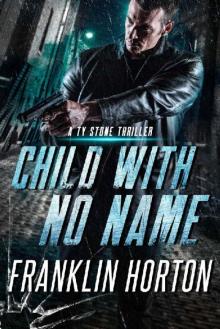 Child With No Name
Child With No Name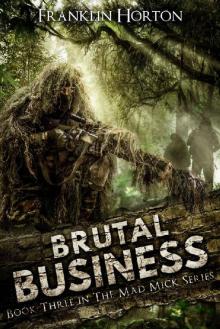 Brutal Business: Book Three in the Mad Mick Series
Brutal Business: Book Three in the Mad Mick Series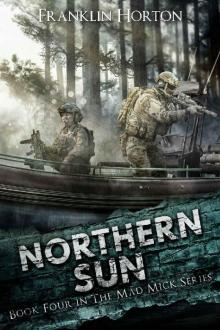 Northern Sun: Book Four in The Mad Mick Series
Northern Sun: Book Four in The Mad Mick Series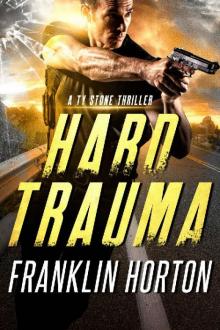 Hard Trauma
Hard Trauma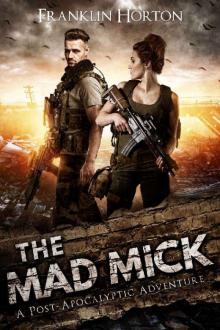 The Mad Mick: Book One of The Mad Mick Series
The Mad Mick: Book One of The Mad Mick Series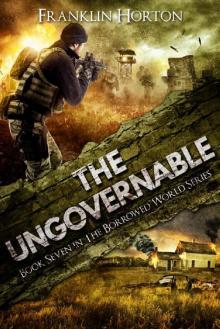 The Ungovernable
The Ungovernable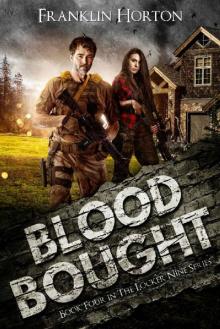 Blood Bought: Book Four in The Locker Nine Series
Blood Bought: Book Four in The Locker Nine Series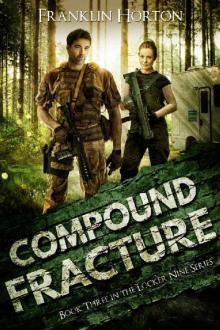 Compound Fracture
Compound Fracture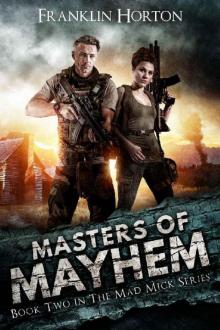 Masters of Mayhem
Masters of Mayhem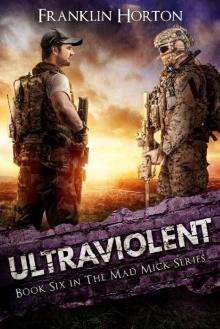 Ultraviolent: Book Six in The Mad Mick Series
Ultraviolent: Book Six in The Mad Mick Series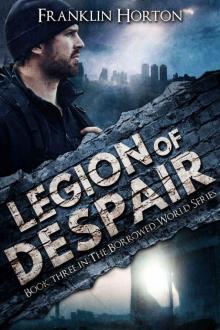 The Borrowed World (Book 3): Legion of Despair
The Borrowed World (Book 3): Legion of Despair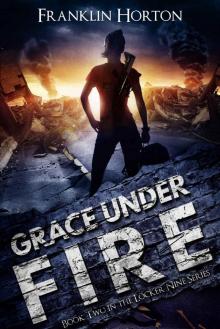 Grace Under Fire: Book Two In The Locker Nine Series
Grace Under Fire: Book Two In The Locker Nine Series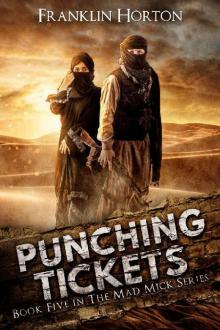 Punching Tickets: Book Five in The Mad Mick Series
Punching Tickets: Book Five in The Mad Mick Series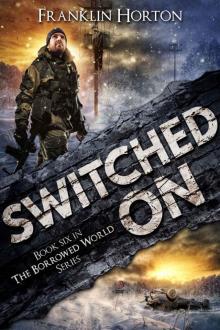 Switched On: Book Six in The Borrowed World Series
Switched On: Book Six in The Borrowed World Series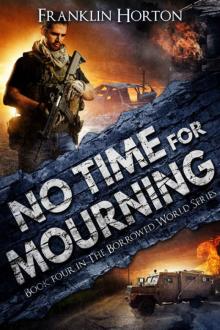 No Time For Mourning: Book Four in The Borrowed World Series
No Time For Mourning: Book Four in The Borrowed World Series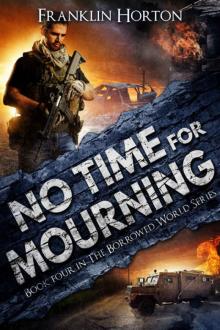 The Borrowed World (Book 4): No Time For Mourning
The Borrowed World (Book 4): No Time For Mourning Random Acts
Random Acts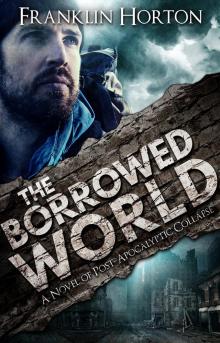 The Borrowed World: A Novel of Post-Apocalyptic Collapse
The Borrowed World: A Novel of Post-Apocalyptic Collapse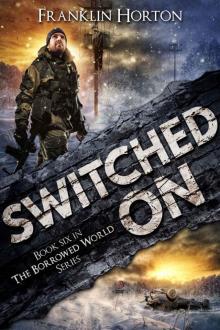 Switched On
Switched On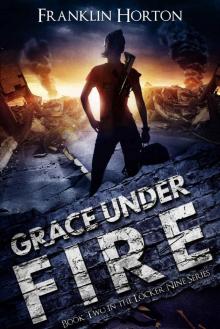 Grace Under Fire
Grace Under Fire Valley of Vengeance: Book Five in The Borrowed World Series
Valley of Vengeance: Book Five in The Borrowed World Series